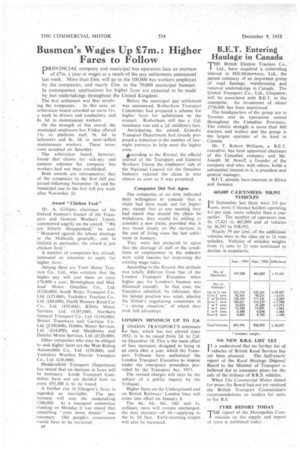Busmen's Wages Up £7m.: Higher Fares to Follow
Page 42

If you've noticed an error in this article please click here to report it so we can fix it.
PROVINCIAL company and municipal bus operators face an increase of £7m. a year in wages as a result of the pay settlements announced last week. More than £4m_ will go to the 100,000 bus workers employed by the companies, and nearly Dm. to the 70;000 municipal busmen. In consequence, applications for higher fares are expected to be made by bus undertakings throughout the United Kingdom.
The first settlement was that involv-' Before the municipal pay settlement• ing the companies. In this case, an
arbitration board awarded an extra lls. a week to drivers and conductors, and 8s. 3d. to maintenance workers.
On the strength of this award, the municipal employers last Friday offered 1 Is. to platform staff. 9s. 6d. to labourers and 8s. 3d. to semi-skilled maintenance workers. These terms were accepted on Saturday.
The arbitration board„ however, found that claims for sick-pay and pension schemes for company bus workers had not been established.
Both awards are retrospective; that of the companies to the first full pay period following November 18, and the municipal one to the first full pay week after November 10.
Award "Chicken Feed" Mr. A. Gilliam, chairman of the -Oxford busmen's branch of the-Transport and General Workers' Union, commented angrily on the award. "We are bitterly disappointed," he said. "Measured against the labour shortage in the Midlands generalb.., and in Oxford in particular, the award is just chicken feed."
A number of eompanieshas already intimated an intention to apply for higher fares.
Among these are Trent Motor Traction Co., Ltd., who estimate that the higher pay will cost them an extra £70,000 a year. Birmingham and Midland Motor Omnibus Co.. Ltd. (£330,000). South Wales Transport Co., Ltd. (£55,000), Yorkshire Traction. Co., Ltd. (£60,001)), North Western Road Car Co., Ltd. (195,000), Ribble Motor Services. Ltd. (1185,000). Northern General Transport Co.. Ltd. (£194,000), Bristol Tramways and Carriage Co., Ltd. c£100,000), Hebble Motor Services, Ltd. (£14,000), and Maidstone and District Motor Services, Ltd. (£120,000).
Other companies who may be obliged to seekhigher fares are the West Riding Automobile Co., Ltd. (170,000), and Yorkshire Woollen District Transport Co.. Ltd. (£36,000).
Huddersfield Transport Department has stated that an increase in fares will be necessary. Leeds Transport Committee have not yet decided how an extra £93,500 is to he found.
A further rise in Glasgow's fares is regarded as inevitable. The pay increase will cost the undertaking £280,000. At a transport committee meeting on Monday it was stated that something " even more drastic" was necessary. Old people's concessions would have to be reviewed.
aff
was announced, Rotherham Transport Committee had prepared a scheme for higher fares for submission to the council. Rotherham still has a ld. minimum rate and a Id. children's fare.
Anticipating the award, Grimsby Transport Department had already proposed a reduction in the number of latenight journeys to help meet the higher costs.
according to the Record, the official journal of the Transport and General Workers' Union, the employers' side of the National Council for the Omnibus Industry rejected the claim in toto almost as soon as it was presented.
Companies Did Not Agree The companies at no time indicated their willingness to concede that a claim had been made out for higher pay, except that at one meeting they had stated that should the claim be withdrawn, they would-be willing to consider a new -claim, provided that it was based simply on the increase in the cost of living since the last settlement in January.
They were not prepared to agree that the shortage of staff or the conditions of employment in the industry were valid reasons for improving the existing wage rates.
According to the Record, this attitude was totally different from that of the London Transport Executive when higher pay for London's busmen was discussed recently. In that case. the Executive admitted, by inference, that the labour position was acute, placing the Union's negotiating committee in "a strong situation," of which they took full advantage.




















































































































